| Srl | Item |
| 1 |
ID:
133617
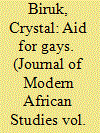

|
|
|
|
|
| Publication |
2014.
|
| Summary/Abstract |
In recent years, 'African homophobia' has become a spectacle on the global stage, making Africa into a pre-modern site of anti-gay sentiment in need of Western intervention. This article suggests that 'homophobia' in post-2009 Malawi is an idiom through which multiple actors negotiate anxieties around governance and moral and economic dependency. I illustrate the material conditions that brought about social imaginaries of inclusion and exclusion - partially expressed through homophobic discourse - in Malawi. The article analyses the cascade of events that led to a moment of political and economic crisis in mid-2011, with special focus on how a 2009 sodomy case made homophobia available as a new genre of social commentary. Employing discourse analysis of newspaper articles, political speeches, the proceedings of a sodomy case, and discussions about men who have sex with men (MSM) as an HIV risk group, I show how African homophobia takes form via interested deployments of 'cultural' rhetoric toward competing ends. This article lends a comparative case study to a growing literature on the political and social functions of homophobia in sub-Saharan Africa.
|
|
|
|
|
|
|
|
|
|
|
|
|
|
|
|
| 2 |
ID:
133618
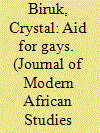

|
|
|
|
|
| Publication |
2014.
|
| Summary/Abstract |
In recent years, 'African homophobia' has become a spectacle on the global stage, making Africa into a pre-modern site of anti-gay sentiment in need of Western intervention. This article suggests that 'homophobia' in post-2009 Malawi is an idiom through which multiple actors negotiate anxieties around governance and moral and economic dependency. I illustrate the material conditions that brought about social imaginaries of inclusion and exclusion - partially expressed through homophobic discourse - in Malawi. The article analyses the cascade of events that led to a moment of political and economic crisis in mid-2011, with special focus on how a 2009 sodomy case made homophobia available as a new genre of social commentary. Employing discourse analysis of newspaper articles, political speeches, the proceedings of a sodomy case, and discussions about men who have sex with men (MSM) as an HIV risk group, I show how African homophobia takes form via interested deployments of 'cultural' rhetoric toward competing ends. This article lends a comparative case study to a growing literature on the political and social functions of homophobia in sub-Saharan Africa.
|
|
|
|
|
|
|
|
|
|
|
|
|
|
|
|
| 3 |
ID:
087517
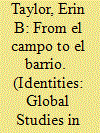

|
|
|
|
|
| Publication |
2009.
|
| Summary/Abstract |
In the social imaginaries of the Dominican Republic, national culture has its origins in el campo, the countryside. Country spaces and country people are viewed as embodying the past in the present, making them authentic contemporary carriers of national culture and moral order. By contrast, the city has long been viewed as the site of a modernity that takes its inspiration from outside of the nation but also as a site of social degeneration. In recent decades, representations of poor barrios as a threat to the city's moral order have intensified in reaction to rising crime rates and a series of economic crises. First generation migrants from the country to the city find that their status as carriers of culture and morality is compromised. They evoke positive memories of their rural pasts to position themselves as moral beings transposed to a corrupt urban milieu. At the same time, they develop urban identities that incorporate aspects of rural life while rejecting others. I argue that migrants' memories of their rural past resist their emplacement while allowing for the transformation of their present structural position.
|
|
|
|
|
|
|
|
|
|
|
|
|
|
|
|
| 4 |
ID:
136296


|
|
|
|
|
| Summary/Abstract |
Sri Lankan Catholic migrants find Italy to be a destination that offers plenty of opportunities for material advancement. However, as employment for skilled workers is scarce, lack of formal education becomes a comparative advantage in the Italian migrant labor market. The multiple ways in which migrants to Italy display their economic success across Sri Lankan hometowns have encouraged young people to opt for migration over schooling, an unlikely phenomenon in a community proud of its tradition of excellence in education. This article suggests that the dream of moving to Italy and finding employment in low-paying jobs is not only a consequence of the material evidence provided by successful migrants. Ideological and ethical changes that precede the booming transnationalism have produced transformations at the level of the imagination that shape the dreams of local youths before they experience what migration can bring. Fieldwork research is based in the predominantly Catholic town of Wennappuwa – which has uncannily embraced the Sinhala moniker of Punchi Italia (Little Italy) – and explores the way in which migration has displaced traditional paths to economic prosperity and social mobility, leaving behind its reputation as Sri Lanka's Guru Gama (Teacher's Village).
|
|
|
|
|
|
|
|
|
|
|
|
|
|
|
|
| 5 |
ID:
160078
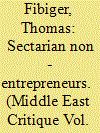

|
|
|
|
|
| Summary/Abstract |
In light of the increasing relevance of sectarianism in recent years, not least in the wake of the Arab revolts since 2011, this article investigates ‘everyday sectarianism’ in Kuwait and Bahrain. It employs the notion of sectarian non-entrepreneurs to address and study how ordinary people live, understand and reproduce sectarian dichotomies, imaginaries and narratives in their everyday lives. The article thereby challenges and broadens a more conventional idea of sectarian entrepreneurs that places key community leaders as the central agents in producing sectarianism. By engaging with people’s everyday experiences, it shows the relevance of the ‘everyday’ as a theoretical concept apt to investigate political and cultural dynamics in the Middle East.
|
|
|
|
|
|
|
|
|
|
|
|
|
|
|
|
| 6 |
ID:
131562
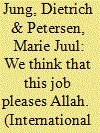

|
|
|
|
|
| Publication |
2014.
|
| Summary/Abstract |
This article explores the role of Islam in contemporary Jordanian charities and social welfare organizations. In what ways do these organizations relate to Islamic traditions in their work? What role do religious convictions play in the construction of modern selfhoods among their employees and volunteers? Do these constructions relate to broader, globally relevant, social imaginaries? The article tries to answer these questions by applying a novel analytical framework to qualitative data from fieldwork conducted among Jordanian charities and social welfare organizations. We treat these organizations as "social sites" for the reinterpretation of Islamic traditions in the context of global modernity as well as for the construction of meaningful forms of modern selfhoods among their members. In doing so, we argue that these specifically Islamic identity constructions can fruitfully be understood with reference to different types of globally relevant social imaginaries.
|
|
|
|
|
|
|
|
|
|
|
|
|
|
|
|